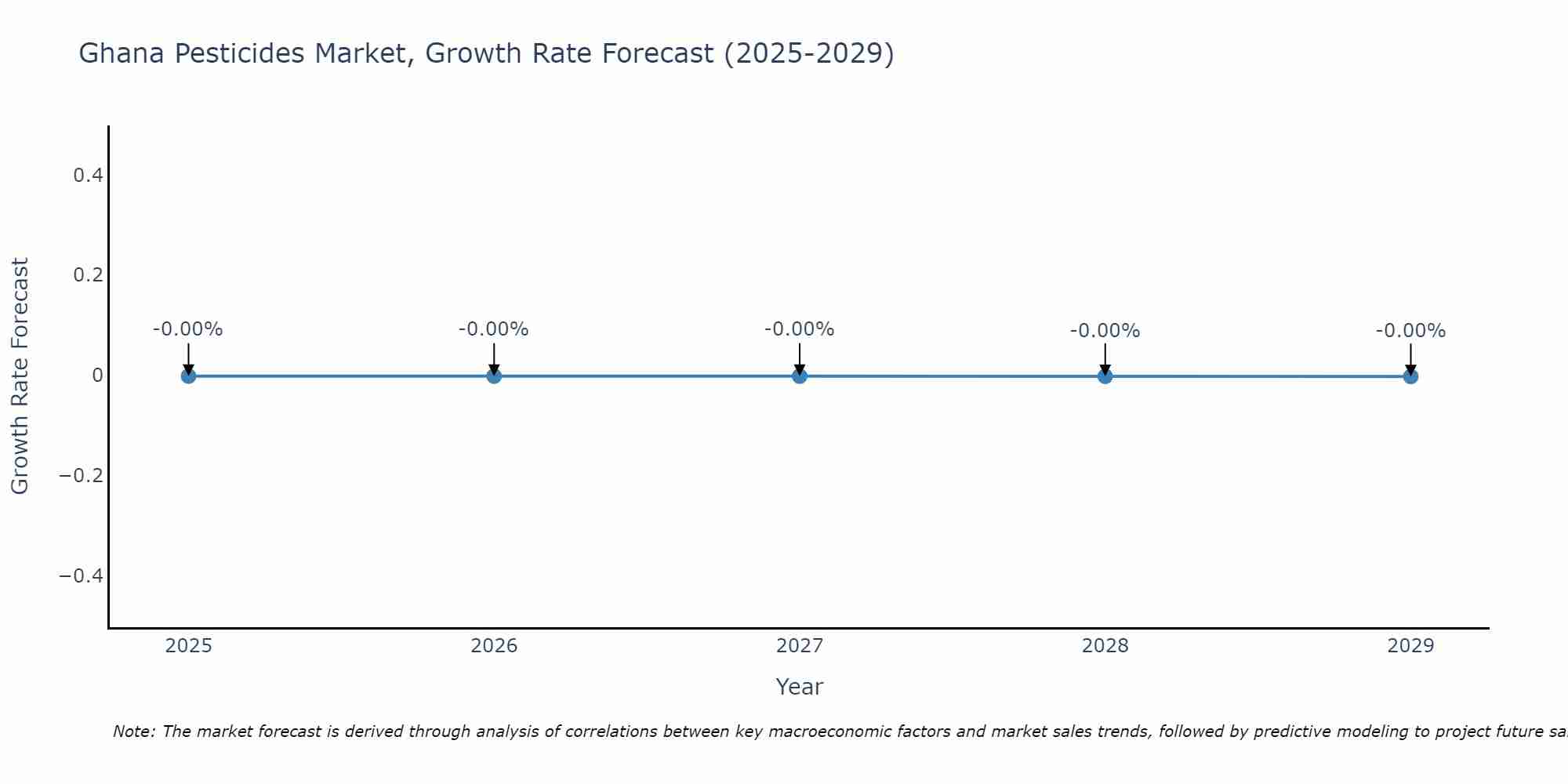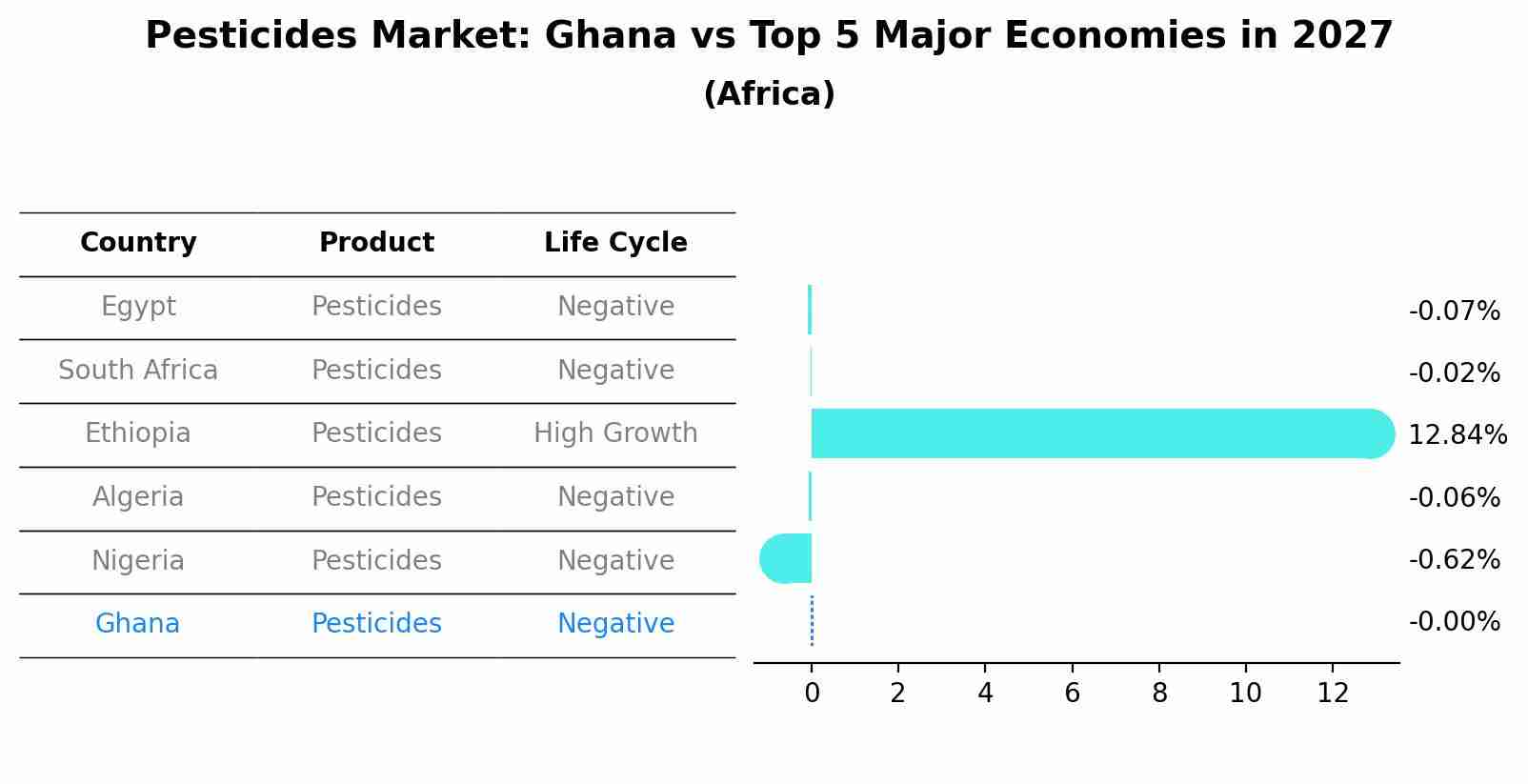Ghana Pesticides Market (2025-2031) Outlook | Share, Growth, Size, Analysis, Industry, Companies, Trends, Forecast, Revenue & Value
| Product Code: ETC338336 | Publication Date: Aug 2022 | Updated Date: Aug 2025 | Product Type: Market Research Report | |
| Publisher: 6Wresearch | Author: Ravi Bhandari | No. of Pages: 75 | No. of Figures: 35 | No. of Tables: 20 |
Ghana Pesticides Market Size Growth Rate
The Ghana Pesticides Market may undergo a gradual slowdown in growth rates between 2025 and 2029. Starting high at -0.00% in 2025, the market steadily declines to -0.00% by 2029.

Pesticides Market: Ghana vs Top 5 Major Economies in 2027 (Africa)
By 2027, Ghana's Pesticides market is forecasted to achieve a negative growth rate of -0.00%, with Egypt leading the Africa region, followed by South Africa, Ethiopia, Algeria and Nigeria.

Ghana Pesticides Market Synopsis
The Ghana pesticides market is witnessing steady growth due to increasing agricultural activities and the need to protect crops from pests and diseases. The market is driven by factors such as rising demand for higher crop yields, growing awareness about the benefits of pesticides in agriculture, and government initiatives to promote modern farming practices. Key players in the Ghana pesticides market include multinational companies as well as local manufacturers offering a range of products such as herbicides, insecticides, and fungicides. The market is also witnessing a shift towards more sustainable and environmentally friendly pesticide solutions, driven by concerns over pesticide residues in food products and their impact on human health and the environment. Overall, the Ghana pesticides market presents opportunities for both domestic and international players to innovate and offer effective solutions to meet the evolving needs of the agricultural sector.
Ghana Pesticides Market Trends
The Ghana Pesticides Market is experiencing a shift towards more sustainable and eco-friendly products due to increasing awareness about environmental protection and health concerns. Biopesticides, which are derived from natural materials, are gaining popularity as they are seen as safer alternatives to traditional chemical pesticides. Additionally, there is a growing demand for integrated pest management solutions that focus on a holistic approach to pest control, combining various methods such as biological controls and cultural practices. Government regulations promoting the use of environmentally friendly pesticides are also influencing the market dynamics. Overall, the trend towards sustainable and less harmful pesticides is shaping the Ghanaian market as consumers and farmers prioritize safety and environmental sustainability in pest management practices.
Ghana Pesticides Market Challenges
The Ghana pesticides market faces several challenges, including inadequate regulation and enforcement leading to the presence of counterfeit and substandard products. Poor farmer education and training on proper pesticide use also contribute to misuse and overuse of chemicals, leading to environmental pollution and health risks. Limited access to modern and effective pesticides among smallholder farmers hinders crop productivity and quality. Additionally, the high cost of quality pesticides further restricts small farmers` ability to control pests effectively. Lack of proper storage facilities and handling practices result in pesticide contamination, posing risks to both human health and the environment. Addressing these challenges requires stronger regulatory measures, increased farmer education, improved access to quality products, and better storage and handling practices in the Ghana pesticides market.
Ghana Pesticides Market Investment Opportunities
The Ghana pesticides market offers promising investment opportunities due to the country`s growing agricultural sector and increasing focus on pest management to boost crop yields. Key areas for investment include biopesticides, as there is a rising demand for environmentally friendly and sustainable pest control solutions. Additionally, investing in the development and distribution of integrated pest management systems could be lucrative, as farmers seek more effective and efficient ways to protect their crops. With the government`s initiatives to promote modern agricultural practices and improve food security, there is a steady demand for a wide range of pesticides across various crop segments. Overall, the Ghana pesticides market presents opportunities for investors to capitalize on the evolving agricultural landscape and contribute to the country`s agricultural growth.
Jordan Agar Market Government Policies
The Ghanaian government has established the Environmental Protection Agency (EPA) to regulate the importation, distribution, sale, and use of pesticides in the country. The EPA is responsible for approving all pesticides before they can be marketed or used in Ghana, ensuring they meet safety and efficacy standards. Additionally, there are regulations in place to monitor and control the use of pesticides to minimize environmental impact and protect public health. The government also promotes the adoption of integrated pest management practices to reduce reliance on chemical pesticides and encourage sustainable agriculture. Overall, the government`s policies aim to safeguard human health, protect the environment, and promote sustainable agricultural practices in the Ghanaian pesticides market.
Ghana Pesticides Market Future Outlook
The Ghana pesticides market is expected to witness steady growth in the coming years due to factors such as increasing agricultural activities, rising demand for high-quality crops, and the need to combat pest infestations. The government`s initiatives to promote sustainable agriculture practices and improve crop yields are also likely to drive market growth. Additionally, the growing awareness among farmers about the benefits of using pesticides to protect their crops from diseases and pests is expected to contribute to market expansion. However, challenges such as environmental concerns, regulatory restrictions, and the shift towards organic farming practices may pose some constraints on market growth. Overall, the Ghana pesticides market is projected to experience moderate growth in the foreseeable future, with opportunities for innovative and eco-friendly pesticide solutions to gain traction.
Key Highlights of the Report:
- Ghana Pesticides Market Outlook
- Market Size of Ghana Pesticides Market, 2024
- Forecast of Ghana Pesticides Market, 2031
- Historical Data and Forecast of Ghana Pesticides Revenues & Volume for the Period 2021 - 2031
- Ghana Pesticides Market Trend Evolution
- Ghana Pesticides Market Drivers and Challenges
- Ghana Pesticides Price Trends
- Ghana Pesticides Porter's Five Forces
- Ghana Pesticides Industry Life Cycle
- Historical Data and Forecast of Ghana Pesticides Market Revenues & Volume By Product Type for the Period 2021 - 2031
- Historical Data and Forecast of Ghana Pesticides Market Revenues & Volume By Conventional Chemicals for the Period 2021 - 2031
- Historical Data and Forecast of Ghana Pesticides Market Revenues & Volume By Bio pesticides for the Period 2021 - 2031
- Historical Data and Forecast of Ghana Pesticides Market Revenues & Volume By Application for the Period 2021 - 2031
- Historical Data and Forecast of Ghana Pesticides Market Revenues & Volume By Pre-Harvest for the Period 2021 - 2031
- Historical Data and Forecast of Ghana Pesticides Market Revenues & Volume By Post-Harvest for the Period 2021 - 2031
- Ghana Pesticides Import Export Trade Statistics
- Market Opportunity Assessment By Product Type
- Market Opportunity Assessment By Application
- Ghana Pesticides Top Companies Market Share
- Ghana Pesticides Competitive Benchmarking By Technical and Operational Parameters
- Ghana Pesticides Company Profiles
- Ghana Pesticides Key Strategic Recommendations
Frequently Asked Questions About the Market Study (FAQs):
1 Executive Summary |
2 Introduction |
2.1 Key Highlights of the Report |
2.2 Report Description |
2.3 Market Scope & Segmentation |
2.4 Research Methodology |
2.5 Assumptions |
3 Ghana Pesticides Market Overview |
3.1 Ghana Country Macro Economic Indicators |
3.2 Ghana Pesticides Market Revenues & Volume, 2021 & 2031F |
3.3 Ghana Pesticides Market - Industry Life Cycle |
3.4 Ghana Pesticides Market - Porter's Five Forces |
3.5 Ghana Pesticides Market Revenues & Volume Share, By Product Type, 2021 & 2031F |
3.6 Ghana Pesticides Market Revenues & Volume Share, By Application, 2021 & 2031F |
4 Ghana Pesticides Market Dynamics |
4.1 Impact Analysis |
4.2 Market Drivers |
4.2.1 Increasing demand for food production due to population growth |
4.2.2 Growing awareness about the importance of crop protection |
4.2.3 Adoption of modern farming techniques and technologies |
4.3 Market Restraints |
4.3.1 Stringent regulations on pesticide usage and environmental impact |
4.3.2 Availability of alternative pest control methods like organic farming |
5 Ghana Pesticides Market Trends |
6 Ghana Pesticides Market, By Types |
6.1 Ghana Pesticides Market, By Product Type |
6.1.1 Overview and Analysis |
6.1.2 Ghana Pesticides Market Revenues & Volume, By Product Type, 2021 - 2031F |
6.1.3 Ghana Pesticides Market Revenues & Volume, By Conventional Chemicals, 2021 - 2031F |
6.1.4 Ghana Pesticides Market Revenues & Volume, By Bio pesticides, 2021 - 2031F |
6.2 Ghana Pesticides Market, By Application |
6.2.1 Overview and Analysis |
6.2.2 Ghana Pesticides Market Revenues & Volume, By Pre-Harvest, 2021 - 2031F |
6.2.3 Ghana Pesticides Market Revenues & Volume, By Post-Harvest, 2021 - 2031F |
7 Ghana Pesticides Market Import-Export Trade Statistics |
7.1 Ghana Pesticides Market Export to Major Countries |
7.2 Ghana Pesticides Market Imports from Major Countries |
8 Ghana Pesticides Market Key Performance Indicators |
8.1 Adoption rate of integrated pest management practices |
8.2 Percentage of farmers trained in safe pesticide handling |
8.3 Investment in research and development for sustainable pesticide solutions |
9 Ghana Pesticides Market - Opportunity Assessment |
9.1 Ghana Pesticides Market Opportunity Assessment, By Product Type, 2021 & 2031F |
9.2 Ghana Pesticides Market Opportunity Assessment, By Application, 2021 & 2031F |
10 Ghana Pesticides Market - Competitive Landscape |
10.1 Ghana Pesticides Market Revenue Share, By Companies, 2024 |
10.2 Ghana Pesticides Market Competitive Benchmarking, By Operating and Technical Parameters |
11 Company Profiles |
12 Recommendations |
13 Disclaimer |
- Single User License$ 1,995
- Department License$ 2,400
- Site License$ 3,120
- Global License$ 3,795
Search
Thought Leadership and Analyst Meet
Our Clients
Related Reports
- Afghanistan Apparel Market (2026-2032) | Growth, Outlook, Industry, Segmentation, Forecast, Size, Companies, Trends, Value, Share, Analysis & Revenue
- Canada Oil and Gas Market (2026-2032) | Share, Segmentation, Value, Industry, Trends, Forecast, Analysis, Size & Revenue, Growth, Competitive Landscape, Outlook, Companies
- Germany Breakfast Food Market (2026-2032) | Industry, Share, Growth, Size, Companies, Value, Analysis, Revenue, Trends, Forecast & Outlook
- Australia Briquette Market (2025-2031) | Growth, Size, Revenue, Forecast, Analysis, Trends, Value, Share, Industry & Companies
- Vietnam System Integrator Market (2025-2031) | Size, Companies, Analysis, Industry, Value, Forecast, Growth, Trends, Revenue & Share
- ASEAN and Thailand Brain Health Supplements Market (2025-2031) | Strategy, Consumer Insights, Analysis, Investment Trends, Opportunities, Growth, Size, Share, Industry, Revenue, Segments, Value, Segmentation, Supply, Forecast, Restraints, Outlook, Competition, Drivers, Trends, Demand, Pricing Analysis, Competitive, Strategic Insights, Companies, Challenges
- ASEAN Bearings Market (2025-2031) | Strategy, Consumer Insights, Analysis, Investment Trends, Opportunities, Growth, Size, Share, Industry, Revenue, Segments, Value, Segmentation, Supply, Forecast, Restraints, Outlook, Competition, Drivers, Trends, Demand, Pricing Analysis, Competitive, Strategic Insights, Companies, Challenges
- Europe Flooring Market (2025-2031) | Outlook, Share, Industry, Trends, Forecast, Companies, Revenue, Size, Analysis, Growth & Value
- Saudi Arabia Manlift Market (2025-2031) | Outlook, Size, Growth, Trends, Companies, Industry, Revenue, Value, Share, Forecast & Analysis
- Uganda Excavator, Crane, and Wheel Loaders Market (2025-2031) | Strategy, Consumer Insights, Analysis, Investment Trends, Opportunities, Growth, Size, Share, Industry, Revenue, Segments, Value, Segmentation, Supply, Forecast, Restraints, Outlook, Competition, Drivers, Trends, Demand, Pricing Analysis, Competitive, Strategic Insights, Companies, Challenges
Industry Events and Analyst Meet
Whitepaper
- Middle East & Africa Commercial Security Market Click here to view more.
- Middle East & Africa Fire Safety Systems & Equipment Market Click here to view more.
- GCC Drone Market Click here to view more.
- Middle East Lighting Fixture Market Click here to view more.
- GCC Physical & Perimeter Security Market Click here to view more.
6WResearch In News
- Doha a strategic location for EV manufacturing hub: IPA Qatar
- Demand for luxury TVs surging in the GCC, says Samsung
- Empowering Growth: The Thriving Journey of Bangladesh’s Cable Industry
- Demand for luxury TVs surging in the GCC, says Samsung
- Video call with a traditional healer? Once unthinkable, it’s now common in South Africa
- Intelligent Buildings To Smooth GCC’s Path To Net Zero


















